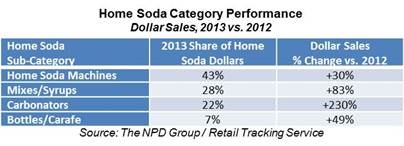The in-home soda machine market is about to become a battleground as its established leader faces competition from two of the biggest names in the beverage business.
Home soda machine sales grew by 30% in 2013 and sales of complementary products such as CO2 carbonators, bottles, mixes, and syrups more than doubled over the previous year, according to a report from the NPD Group. Sales of CO2 carbonators, used in the soda-making process, also more than doubled in 2013, which is a good indication that consumers are actually using their machines.

SodaStream (SODA +0.00%) essentially has a monopoly in the home soda machine market currently. Yes, there are some knockoffs and some minor players, but SodaStream essentially created the category and rode it to $562 million in sales in 2013 -- an increase from $436 million in 2012.
The market for making soda at home is about to get a lot more crowded. Coca-Cola (KO +0.00%) is partnering with Keurig Green Mountain (GMCR +0.00%) to launch Keurig Cold later this year and Pepsico (PEP +0.46%) has partnered with Bevyz, which debuted a hybrid hot/cold beverage machine at the 2014 International Home + Housewares Show.
"Home soda makers as a category is still in its infancy with relatively low household penetration. The potential of these machines is contingent upon broadening the category's appeal with a wider variety of uses and offerings, ease of obtaining the consumables, and price," said NPD Group Executive Director Debra Mednick.
How big is the potential market?
Home coffee makers have been around in some fashion since 575 A.D., according to Coffee.org, and the modern drip brewer was introduced by Mr. Coffee in 1972. The current rage however -- single-serve coffee machines that brew from pods -- had sales that were "barely noticeable five years ago," The Seattle Times reported. They now account for more than a quarter of every dollar Americans spend on coffee to drink at home. By 2018, market-research firm Mintel expects consumers to spend nearly as much on coffee pods as they do on bulk coffee, according to the paper.
Since 2007 the global coffee capsules market has grown at more than five times the rate of the overall coffee industry, according to Euromonitor International. Capsule sales neared $11 billion in 2013.
The market for at-home soda making might not grow that large that quickly, but producing soda at home has advantages (not having to lug home heavy bottles and cans being one) that should keep it on an upward trajectory.
The machine allows for changing tastes
One of the key factors pushing the trend is that the technology can change as consumers' tastes in beverages do. Just like your Keurig K-Cup single-serve machine can be used to make regular coffee, decaf, hot chocolate, or tea, SodaStream and its competitors make a wide array of drinks.
"The home soda category continues to appeal to consumers seeking convenient ways to customize beverages that range from plain seltzer to flavored options on demand, while also being friendly to their wallets and the environment," said Mednick. "Overall consumption of traditional soda in the home has declined, giving home soda machine manufacturers and beverage companies an opportunity to offset the trend by introducing new product offerings that capitalize on current consumer beverage preferences."
Whether it's a SodaStream machine or one of the upcoming competitors, there's a flexibility inherent in the system that makes it useful regardless of what's in vogue. SodaStream offers flavors ranging from traditional sodas to flavored waters, energy drinks, and cocktail mixers.
New competitors may grow the field
Coca-Cola and Keurig aren't just releasing an in-home soda machine together. The companies not only signed a 10-year deal to collaborate on the development and introduction of Coca-Colas brands on the Keurig Cold, Coke paid around $1.25 billion for a 10% stake in Keurig.
Pespi's deal with Bevyz is less comprehensive and not exclusive, according to a piece by fellow Fool Ted Cooper. The Bevyz Fresh Machine is a potential category changer -- a multi-drink countertop system that combines a water cooler, coffee/tea machine, and a soft drink/juice dispenser. Bevyz is a small company though and Pepsi could still make a deal with SodaStream or even pursue a partnership with Keurig (if Coke allows that).
Currently SodaStream offers generic soda products that lack the branding excitement of being able to make Coke or Pepsi in your own home. The presence of those two giants -- even if they are on their own platform -- could help grow acceptance of at-home soda making. It's also possible that SodaStream will manage to hold its lead given its head start and Coke and Pepsi will want to license their brands for inclusion on the dominant platform. There is precedent for that as Starbucks (SBUX +0.70%) has its own Verismo single-service machines but it also has a deal with Keurig to make K-Cups for its much more successful machines.
The field is wide open
SodaStream has a huge lead but the category is so new that a large part of the potential audience does not even know it exists. Coke, Pepsi, and Keurig joining the fray are likely to change that. Neither Coke nor Pepsi ever does anything small and Keurig has experience getting customers to sample a product that it did not know it wanted. The potential exists that SodaStream as the established player could continue to grow and one or both of the new competitors could simply make the market larger.
Making soda at home may not be as ingrained as the concept of making coffee at home, but a machine that lets people "brew" whatever soda, energy drink, or flavored water they want could catch on in a much larger fashion than it has. Add in the presence of the biggest brands in the game and the ceiling moves even higher.
